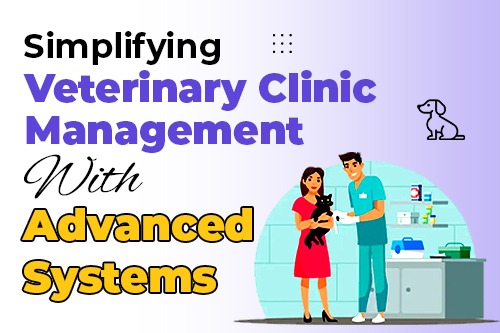Published on September 15, 2023
Simplifying Veterinary Clinic Management with Advanced Systems

In the dynamic world of veterinary medicine, the efficient management of clinic operations is paramount to providing quality care to animal patients while ensuring smooth interactions with clients.
Traditional methods of clinic management , such as manual appointment scheduling, paper-based record-keeping, and disjointed communication channels, often prove to be inefficient and prone to errors.
However, with the advent of Veterinary Clinic Management Systems, veterinary practices can now leverage advanced software solutions to streamline their operations, enhance efficiency, and deliver superior patient care. This comprehensive guide explores the various features and benefits of Veterinary Clinic Management Systems, shedding light on how these systems revolutionize the way veterinary clinics operate.
What are Veterinary Clinic Management Systems?
A Veterinary Clinic Management System is a comprehensive software solution designed to centralise and automate various administrative tasks within a veterinary practice.
From appointment scheduling and medical records management to inventory control and billing, these systems encompass a wide range of functionalities tailored specifically to the needs of veterinary professionals.
Benefits of Veterinary Clinic Management Systems
Streamlining Appointment Scheduling
One of the primary features of a Veterinary Clinic Management System is its ability to simplify appointment scheduling. With just a few clicks, clinic staff can efficiently take appointments, reschedule appointments, and manage the availability of veterinarians and other resources.
This streamlined process reduces the likelihood of scheduling conflicts, minimizes wait times for clients, and optimizes the utilization of clinic resources.
Efficient Patient Records Management
Maintaining accurate and up-to-date patient records is essential for delivering high-quality veterinary care.
Veterinary Clinic Management Systems provide a centralised platform for storing and managing patient information, including medical history, treatment plans, diagnostic results, and vaccination records. This digital repository not only ensures data integrity but also facilitates quick access to critical information during consultations and treatments.
Enhanced Client Communication
Effective communication is key to building strong relationships with clients and fostering trust in veterinary practices. Veterinary Clinic Management Systems offer various communication tools, such as automated appointment reminders, follow-up emails, and text message notifications, to keep clients informed and engaged throughout their pet's healthcare journey.
By staying connected with clients, clinics can improve client satisfaction and encourage repeat visits.
Inventory Control and Supply Management
Managing inventory and supplies is another crucial aspect of veterinary clinic operations. Veterinary Clinic Management Systems enable clinics to monitor inventory levels, track product usage, and generate automated reorder alerts to ensure that essential supplies are always available when needed.
This proactive approach to inventory management minimises stockouts, reduces wastage, and optimises inventory costs.
Billing and Financial Management
Efficient billing and financial management are essential for the financial health of veterinary clinics. Veterinary Clinic Management Systems automate the billing process, allowing clinics to generate invoices, process payments, and track financial transactions with ease.
Additionally, these systems offer robust reporting capabilities, providing insights into revenue streams, expenses, and profitability to support informed decision-making.
Data Security and Compliance
Protecting sensitive patient information and ensuring compliance with data privacy regulations are paramount concerns for veterinary clinics.
Veterinary Clinic Management Systems incorporate advanced security features, such as encryption, access controls, and regular data backups, to safeguard patient data from unauthorised access, loss, or theft.
Moreover, these systems are designed to comply with industry standards and regulations, such as the Health Insurance Portability and Accountability Act (HIPAA), to maintain confidentiality and integrity of patient records.
Conclusion
In conclusion, Veterinary Clinic Management Systems play a vital role in simplifying and optimising the management of veterinary clinics.
By streamlining appointment scheduling, centralising patient records, enhancing client communication, optimising inventory control, facilitating billing and financial management, and ensuring data security and compliance, these systems empower veterinary professionals to focus on what matters most – providing exceptional care to their animal patients.
Embracing technology-driven solutions not only improves operational efficiency but also elevates the overall quality of care and client experience in veterinary practices.